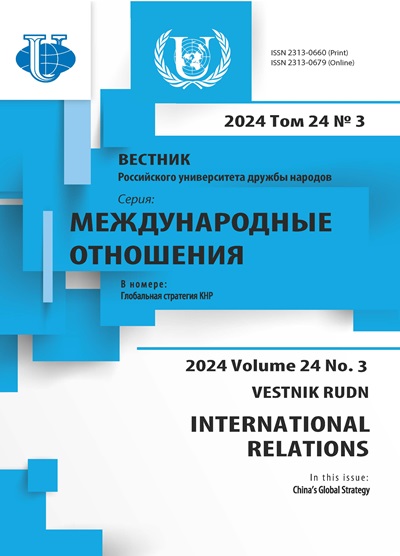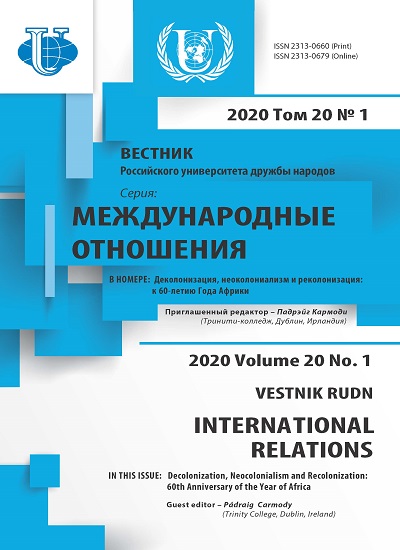Нарративные и критические образы в международных отношениях
- Авторы: Де Оливейра Д.1
-
Учреждения:
- Папский католический университет Минас-Жерайс
- Выпуск: Том 20, № 1 (2020): Деколонизация, неоколониализм и реколонизация: к 60-летию Года Африки
- Страницы: 131-146
- Раздел: ТЕМАТИЧЕСКОЕ ДОСЬЕ
- URL: https://journals.rudn.ru/international-relations/article/view/23327
- DOI: https://doi.org/10.22363/2313-0660-2020-20-1-131-146
Цитировать
Полный текст
Аннотация
Нарративные подходы привлекают все большее внимание исследователей международных отношений. Одной из ключевых предпосылок данного подхода является рассмотрение разнообразных толкований и изучение противоречивости политики таким образом, чтобы рассматривать международные отношения как множественность мира(ов) в рамках мировой политики. Эта статья содержит анализ использования нарративных подходов к изучению международных отношений и связывает их с понятием «приземленности» Эдварда Саида, которое позволяет подчеркнуть политические аспекты литературных произведений и репрезентации в академических исследованиях. «Поворот к нарративу» помещается в более широкий контекст кризиса евроцентризма знаний и представлений о международных отношениях. Кроме того, в статье демонстрируется растущее значение демонстрации «Я» исследователя в научных текстах. Имея в виду общее стремление к более чутким отношениям между исследователем и предметом исследования, учеными и общественностью в целом, преподавателями и студентами, автор кратко излагает опыт открытого обсуждения и практики нарративного подхода в учебной аудитории, когда студенты проявляют тенденцию использовать (или нет) нарративный подход как способ осмыслить свое «Я» в изучении международных отношений.
Ключевые слова
Об авторах
Джессика да Силва К. Де Оливейра
Папский католический университет Минас-Жерайс
Автор, ответственный за переписку.
Email: jessicascoliveira@gmail.com
доктор философии (международные отношения), преподаватель, факультет международных отношений
Посос-де-Кальдас, БразилияСписок литературы
- Anievas, A., Manchanda, N. & Shilliam, R. (Eds). (2015). Race and Racism in International Relations - Confronting the Global Colour Line. London & New York: Routledge.
- Bartelson, J. (1995). A Genealogy of Sovereignty. Cambridge: Cambridge University Press.
- Blaney, D. & Tickner, A. (2017). Worlding, Ontological Politics and the Possibility of Decolonial IR. Millenium: Journal of International Studies, 45 (3), 293-311. doi: 10.1177/0305829817702446
- Brigg, M. & Bleiker, R. (2010). Autoethnographic International Relations: Exploring the Self as a Source of Knowledge. Review of International Studies, 36 (3), 779-798. doi: 10.1017/S0260210510000689
- Campbell, D. (1992). Writing Security: United States Foreign Policy and the Politics of Identity. Minneapolis: University of Minnesota Press.
- Campbell, D., Bialasiewics, L., Elden, S., Graham, S., Jeffrey, A. & Williams, A.J. (2007). Performing Security: The Imaginative Geographies of Current US Strategy. Political Geography, 26, 405-422. DOI: 10.1016/ j.polgeo.2006.12.002
- Cohn, C. (1987). Sex and Death in the Rational World of Defense Intellectuals. Signs, 12 (4), 687-718.
- Dauphinee, E. (2010). The Ethics of Autoethnography. Review of International Studies, 36 (3), 799-818. doi: 10.1017/S0260210510000690
- Dauphinee, E. (2007). The Ethics of Researching War: Looking for Bosnia. Manchester University Press.
- Dauphinee, E. (2013a). Critical Methodological and Narrative Developments in IR: a Forum. URL: https://thedisorderofthings.com/2013/03/12/critical-methodological-and-narrative-developments-in-ir-a-forum/ (accessed: 11.11.2016)
- Dauphinee, E. (2013b). The Politics of Exile. London & New York: Routledge.
- Dauphinee, E. (2013c). Writing as Hope: Reflections on the Politics of Exile. Security Dialogue, 44 (4), 347-361. doi: 10.1177/0967010613492838
- Dauphinee, E. (2015). Narrative Engagement and the Creative Practices of International Relations. In: Steele, B.J. & Amoureux, J. (Eds.). Reflexivity and International Relations: Positionality, Critique, and Practice. London: Routledge. P. 44-60.
- De Oliveira, J. da S.C. (2020). Postcolonial Maghreb and the Limits of IR. London: Palgrave Macmillan.
- Der Derian, J. & Shapiro, M. (Eds.). (1989). International/Intertextual Relations: Postmodern Readings of World Politics. Lexington, MA: Lexington.
- Doty, R.L. (2004). Maladies of Our Souls: Voice and the Writing of Academic International Relations. Cambridge Review of International Affairs, 17 (2), 377-392. doi: 10.1080/0955757042000245951
- Doty, R.L. (2010). Autoethnography - Making Human Connections. Review of International Studies, 36 (3), 1047-1050. doi: 10.1017/S026021051000118X
- Enloe, C. (2004). The Curious Feminist: Searching for Women in a New Age of Empire. Berkeley & Los Angeles: University of California Press.
- Enloe, C. (2014). Bananas, Beaches and Bases: Making Feminist Sense of International Politics. Berkeley: University of California Press.
- Fanon, F. (1963/2004). The Wretched of the Earth. New York: Grove Weidenfeld.
- Foucault, M. (1969/1984). What is an Author? In: Rabinow, P. (Eds.). The Foucault Reader. New York: Pantheon Books. P. 101-120.
- Giroux, H.A. (2004). Edward Said and the Politics of Worldliness: Toward a “Rendezvous of Victory”. Cultural Studies/Critical Methodologies, 4 (3), 339-349. doi: 10.1177/1532708603262783
- Henderson, E.A. (2013). Hidden in Plain Sight: Racism in International Relations Theory. Cambridge Review of International Affairs, 26 (1), 71-92. doi: 10.1080/09557571.2012.710585
- Inayatullah, N. & Blaney, D. (2004). International Relations and the Problem of Difference. New York/London: Routledge.
- Inayatullah, N. (2011). Falling and Flying: an Introduction. In: Inayatullah, N. (Eds.). Autobiographical International Relations - I, IR. London & New York: Routledge. P. 1-12.
- Jackson, P.T. (2011). The Conduct of Inquiry in International Relations. London & New York: Routledge.
- Krishna, S. (1993). The Importance of Being Ironic: A Postcolonial View on Critical International Relations Theory. Alternatives, 18, 385-417. doi: 10.1177/030437549301800306
- Luceli, C. & Sula, E. (2016). Survival ‘Beyond Positivism’? The Debate on Rationalism and Reflectivism in International Relations Theory. Politikon Journal of Political Science, 30, 43-55. doi: 10.22151/politikon.30.3
- Malmvig, H. (2006). State Sovereignty and Intervention: A Discourse Analysis of Interventionary and Non-Interventionary Practices in Kosovo and Algeria. London & New York: Routledge
- Mignolo, W. (2008). The Geopolitics of Knowledge and the Colonial Difference. In: Moraña, M., Dussel, E. & Jáuregui, C.A. (Eds.). Coloniality at Large - Latin America and the Postcolonial Debate. Durham & London: Duke University Press. P. 225-258
- Milliken, J. (1999). The Study of Discourse in International Relations: A Critique of Research and Methods. European Journal of International Relations, 5 (2), 225-254. doi: 10.1177/1354066199005002003
- Moulin, C. (2016). Narrative. In: Mhurchú, A.N. & Shindo, R. (Eds). Critical Imaginations in International Relations. London/New York: Routledge. P. 136-152.
- Muppidi, H. (2013). Reflections on Narrative Voice. URL: https://thedisorderofthings.com/2013/03/23/reflections-on-narrative-voice/ (accessed: 07.05.2017).
- Park-Kang, S. (2015). Fictional IR and Imagination: Advancing Narrative Approaches. Review of International Studies, 41 (2), 361-381. doi: 10.1017/S0260210514000291
- Said, E. (1978). Orientalism. New York: Vintage Books.
- Said, E. (1983). The World, the Text and the Critic. Massachusetts: Harvard University Press.
- Said, E. (1994). Culture and Imperialism. New York: Vintage Books.
- Said, E. (2001). Beginnings. In: Viswanathan, G. (Eds.). Power, Politics, and Culture - Interviews with Edward W. Said. New York: Vintage Books. P. 3-38.
- Sartre, J. P. (1963/2004). Preface. In: Fanon, F. The Wretched of the Earth. New York: Grove Weidenfeld. P. xliii-lxii.
- Shapiro, M. (1989). Textualizing Global Politics. In: Der Derian, J. & Shapiro, M. (Eds.). International/Intertextual Relations - Postmodern Readings of World Politics. New York: Lexington Books. P. 11-22.
- Shindo, R. (2012). Rethinking Community: Translation Space as a Departure from Political Community. International Political Sociology, 6 (2), 149-164. doi: 10.1111/j.1749-5687.2012.00156.x
- Smith, L.T. (1999). Decolonizing Methodologies: Research and Indigenous People. London & New York: Zed Books.
- Suganami, H. (2008). Narrative Explanation and International Relations: Back to Basics. Millennium - Journal of International Studies, 37 (2), 327-356. doi: 10.1177/0305829808097643
- Vitalis, R. (2005). Birth of a Discipline. In: Long, D. & Schmidt, B.C. (Eds.). Imperialism and Internationalism in the Discipline of International Relations. New York: SUNY Press. P. 159-181.
- Vrasti, W. (2010). Dr. Strangelove or How I Learned to Stop Worrying about Methodology and Love Writing. Millenium: Journal of International Studies, 39 (1), 79-88. doi: 10.1177/0305829810371017
- Vrasti, W. (2017). Ethnography/Autoethnography/Autobiography. In: Guillaume, X. & Bilgin, P. (Eds.). Routledge Handbook of International Political Sociology. London/New York: Routledge. P. 272-280.
- Walker, R.B.J. (1993). Inside/Outside: International Relations as Political Theory. Cambridge: Cambridge University Press.
- Weber, C. (2001). International Relations Theory: A Critical Introduction. London/New York: Routledge.
- Wibben, A.T.R. (2011). Feminist Security Studies: A Narrative Approach. New York: Routledge.











